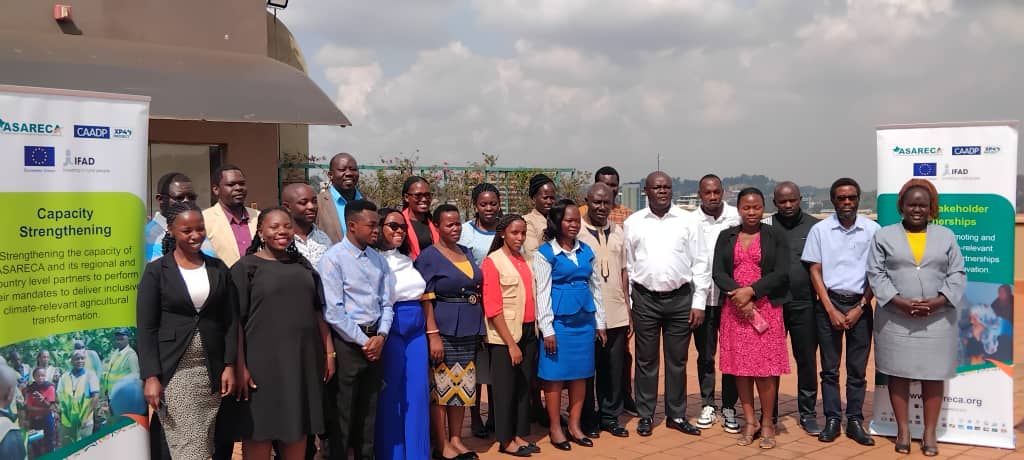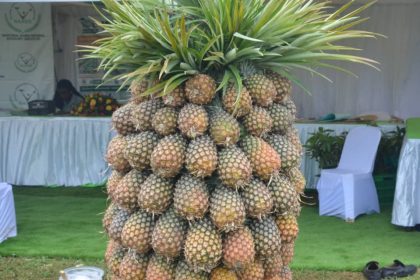ASARECA rallies regional stakeholders to advance agroecology for Africa’s food resilience

A weeklong regional Training of Trainers (ToT) workshop on Integrated Pest and Disease Management (IPM) and agroecology opened in Kampala today, drawing participants from across Eastern and Central Africa in a concerted push for safer, climate-resilient food systems.
Organised by the Association for Strengthening Agricultural Research in Eastern and Central Africa (ASARECA), the European Union-funded training brings together youth and women farmers, scientists, extension workers, and private sector actors from Uganda, Kenya, Tanzania, Ethiopia, Rwanda, Burundi, and Cameroon.
The workshop is part of ASARECA’s implementation of the CAADP-XP4 programme, under the EU’s Development Smart Innovation through Research in Agriculture (DeSIRA) initiative. Now in its final year, the programme—managed by the International Fund for Agricultural Development (IFAD)—focuses on building institutional capacity, nurturing innovation partnerships, and supporting the transformation of regional food systems to meet climate challenges.
“Insect pests and diseases remain a serious threat to food security in the region, with some crops suffering total losses,” said Blaise Amony, Programme Officer for Capacity Development at ASARECA. “This training is about increasing the adoption of biological technologies to produce food in ways that safeguard both human health and the environment.”
Participants are engaging in hands-on sessions covering the 10 elements and 13 principles of agroecology, use of FAO’s Tool for Agroecology Performance Evaluation (TAPE), regenerative agriculture, permaculture, and practical demonstrations of biological pest control solutions. These include beneficial insects, fungi such as Aflasafe, and other bio-based products already gaining traction in Uganda’s banana, coffee, cocoa, and vegetable sectors.
Making the case for agroecology, keynote speaker and farmer Robert Guloba noted that while the Green Revolution of the 1960s helped address food shortages, it also led to diminished biodiversity and the erosion of indigenous food varieties.
“Agroecology is a transformation in how we think about food, health, and the environment,” he said. “We must think about what we want to achieve—is it quantity, quality, and does it matter how it reaches the table?”
The training structure blends classroom learning with field demonstrations, including the use of the Farm Agroecology Criteria Tool (FACT) to assess farms’ ecological resilience.
Special focus is being placed on empowering women and youth, who form the backbone of the region’s agricultural workforce but often face structural barriers to training, inputs, and markets. Beyond technical skills, participants are gaining exposure to accredited networks of suppliers of organic and sustainable technologies.
At the end of the week, trainees are expected to return to their communities as trainers and advocates, cascading their knowledge through farmer cooperatives and local networks. The long-term goal is to build a grassroots movement for agroecological practice across the region—one that helps smallholders adapt to climate change while ensuring access to safe and nutritious food.


 Uganda’s DEI Biopharma gene therapy breakthrough could transform sickle cell treatment
Uganda’s DEI Biopharma gene therapy breakthrough could transform sickle cell treatment
 KPMG flags widening execution gap as tech leaders bet on AI maturity, talent and partnerships
KPMG flags widening execution gap as tech leaders bet on AI maturity, talent and partnerships
 Uganda targets 200,000 visitors for 2026 National Agricultural Show in Jinja
Uganda targets 200,000 visitors for 2026 National Agricultural Show in Jinja
 Uganda coffee earnings hit record UGX 8.8 trillion as export volumes surge
Uganda coffee earnings hit record UGX 8.8 trillion as export volumes surge
 Kiira Motors’ Pearl to Cape Expedition delivers 820-bus order pipeline, recasting Africa’s electric mobility narrative
Kiira Motors’ Pearl to Cape Expedition delivers 820-bus order pipeline, recasting Africa’s electric mobility narrative
 Pearl to Cape electric expedition crosses 81pc mark as Kayoola E-Coach delivers hard performance data
Pearl to Cape electric expedition crosses 81pc mark as Kayoola E-Coach delivers hard performance data